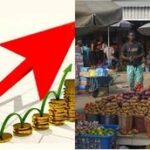Nigeria’s eight-month steady deceleration in headline inflation ended with the marginal spike in the December 2021 numbers, from 15.4% in November 2021 to 15.63%, according to the National Bureau of Statistics (NBS).
Economist and Chief Executive of the Centre for the Promotion of Private Enterprise (CPPE), Dr Muda Yusuf, in a communication with Prime Business Africa on Monday noted that the surge in demand during the December festivities must have played a role in the marginal spike and reversal of the deceleration trend in headline inflation.
The former Director-General of the Lagos Chamber of Commerce and Industry (LCCI), observed that inflationary pressures remain a significant macroeconomic risk in the Nigerian economy and presents major concern to businesses and citizens.
Join our WhatsApp ChannelNigeria has potential to become top investment destination – Muda Yusuf
Food inflation, the biggest worry for the poor, rose from 17.21% in November to 17.37% in December. But on a month-on-month basis, there was an increase of 2.19%.
The Core inflation, which relates to non-agricultural products, maintained an upward trend, increasing from 13.85% in November to 13.87% in December. This, to a large extent, reflects the impact of currency depreciation and the liquidity challenges in the forex market.
Nigeria: 2021 Economic Policy Review And 2022 Agenda
Yusuf noted that, although the economy witnessed an incremental deceleration in inflation over the past eight months before the reversal in December, high inflationary pressures remain a major concern to stakeholders in the Nigeria economy with far-reaching implications:
- Escalation of production and operating costs for businesses, leading to erosion of profit margins, drop in sales, decline in turnover and weak manufacturing capacity utilization,
- High food prices which impacts adversely on citizens welfare and aggravates poverty.
- Weak purchasing power which poses significant risk to business sustainability.
Price volatility which undermines investors’ confidence.
Major Drivers Of Inflation And Costs
The chief drivers of inflation and cost in the economy during the period under review were surge in consumer spending driven by the December festivities; exchange rate depreciation, which has a significant impact on headline inflation, especially the core sub index; liquidity challenges in foreign exchange market impacting adversely on manufacturing output.
Muda Yusuf bows out at LCCI, Almona steps in
There are also security and concerns and climate change affecting agricultural output. There are increasing cases of flooding and desertification in many parts of the country and these have negative impact on agricultural output, according to the economist.
Yusuf also pointed to the structural constraints affecting productivity in the agricultural value chain; high transportation costs affecting distribution costs across the country as also reflected in the huge differential between farm gate prices and market prices.
The CPPE also noted that the Central Bank of Nigeria’s (CBN) Monetization of fiscal deficit [CBN financing of deficit] is highly inflationary because of the liquidity injection effects on the economy. ‘This becomes worrisome when statutory thresholds are exceeded.’
Other divers of the inflationary trend are high transactions costs at the ports, high energy cost and duty on intermediate goods and raw materials, as they increase production and operating costs of businesses.
How To Tame Inflation
According to Yusuf, government needs to fix specific gaps to tame the current inflationary pressure. They include:
- Reforming the foreign exchange market to stabilize the exchange rate and reduce volatility.
- Addressing forex liquidity issues through appropriate policy measures.
- Addressing the security concerns causing disruption to agricultural activities.
- Addressing productivity issues in the real sector of the economy.
- Addressing the challenge of high transportation cost.
- Reducing fiscal deficit financing by the CBN to minimize incidence of high-powered money in the economy.
- Managing climate change consequences to reduce flooding and desertification.
- Ensuring the restoration of normalcy and good order at the nation’s ports to reduce transaction costs.
- Reducing import duty on intermediate products and raw materials for industries to reduce production costs, especially in the light of the sharp depreciation in the exchange rate.
- Addressing concerns around high energy cost.
- Creating an investment friendly tax environment.















Follow Us